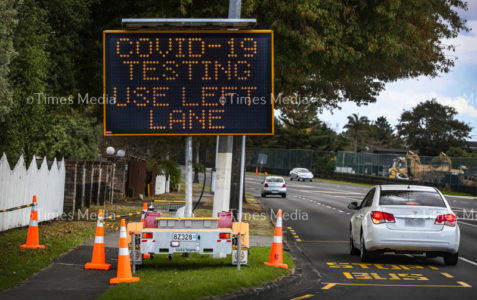There are two new cases of Covid-19 to report in managed isolation facilities in New Zealand today.
It has been 94 days since the last case of Covid-19 was acquired locally from an unknown source.
The first case we are reporting today is a male teenager who arrived in New Zealand from the USA on July 29. He tested positive for Covid-19 as part of routine testing around day 3 of his stay in managed isolation at the Sudima Hotel in Auckland, and has since been transferred to the quarantine facility.
The second case is a man in his 20s who arrived in New Zealand from Switzerland via Amsterdam and Seoul on July 20. He has been staying at the Sudima Hotel in Christchurch and tested negative around day 3 of his stay, then tested positive at his second routine test. This case again emphasises the importance of testing returnees in managed isolation twice before they are able to leave the facility.
The total number of active cases of Covid-19 in New Zealand’s managed isolation and quarantine facilities is now 27.
These cases brings New Zealand’s total number of confirmed cases of Covid-19 to 1,217, which is the number we report to the World Health Organization.
There is no one in New Zealand receiving hospital-level care for Covid-19.
Testing
Yesterday our laboratories processed 1,692 Covid-19 tests, of which 1,259 swabs were taken in the community and 433 swabs were taken in managed isolation or quarantine facilities.
Director-General of Health Dr Ashley Bloomfield said New Zealanders need to continue to be vigilant against the threat of Covid-19 and testing rates need to increase across the country.
“We have seen how quickly infection can spread within communities, cities, and states overseas. There is still a pandemic raging around the globe and while our strict border controls form our first line of defence from the virus, we need to be sure it has not crept undetected into our communities.”
The results from a recent survey of GPs showed that half of the 800 GPs surveyed had seen patients who declined a Covid test and that the proportion of patients that declined was on average 25%.
Dr Bloomfield encouraged all people who are offered a test to have it done.
“To ensure that if there is a case out there it is detected prior to it spreading, patients must present to a care provider, be offered a test, and accept that test.”
Anyone who has symptoms consistent with Covid-19 should seek advice from their GP or Healthline on getting a test, and anyone offered a test should take it up.

National Focal Point process – travellers overseas
On Saturday, we provided context around two recent investigations where travellers from New Zealand were reported by media as having tested positive for Covid-19.
The first investigation involved a woman who transited through Auckland from Los Angeles to Sydney on July 6. We have not identified any close contacts who need to be traced or tested. We continue to work with the airline and airport.
The second investigation involved a woman who travelled from Auckland to Sydney on July 20. Contact tracing has now concluded, and all close contacts have been tested and returned negative results. As we said on Saturday, it appears this may have been a previously undetected case from March or April, which is likely to have led to the positive test result.
With these and any other investigations that may arise during the ongoing global pandemic, it’s also important to reinforce New Zealand’s membership of and relationships within the World Health Organization. Under the International Health Regulations (IHR) 2005 the WHO has an established process for confidential information sharing about health events which takes place between IHR National Focal Points (NFP). The Ministry of Health is the IHR focal point for New Zealand.
There’s more information on the process here: https://www.who.int/health-topics/international-health-regulations#tab=tab_1
This process helps preserve the formal chain of information around global public health.
We work closely with other countries to get formal notification of positive test results and discuss the implications of those when they occur.
We follow any of these up with a risk-based assessment but we do have to confirm these test results formally.
This process avoids unnecessary confusion around situations which may not represent cause for general public health concern in this country.
New Zealanders can be assured that we will continue to adopt a risk-based approach which includes appropriate public awareness, contact tracing and testing for any cases formally identified during this process.
Flu tracking
The Ministry has noted that public participation in surveillance of influenza-like illness has declined from a peak of 70,000 FluTracking survey respondents at Alert Level 4, which is now down to 50,000 respondents.
FluTracking, a simple online initiative, helps monitor flu activity in New Zealand by showing how prevalent flu-like symtpoms are in individual areas. The Ministry is able to use this data to make sure resources, such as vaccinations, are where they are needed most. It is also an important part of our COVID-19 surveillance.
Responding to the survey takes just seconds and becoming a FluTracker is easy – register at flutracking.net
Information gathered is confidential and identifiable data is not shared.
NZ COVID Tracer
NZ COVID Tracer has now recorded 626,400 registered users.
There have been 82,660 posters created, and 1,812,122 poster scans.
There have been 22,916 manual entries into the app.









